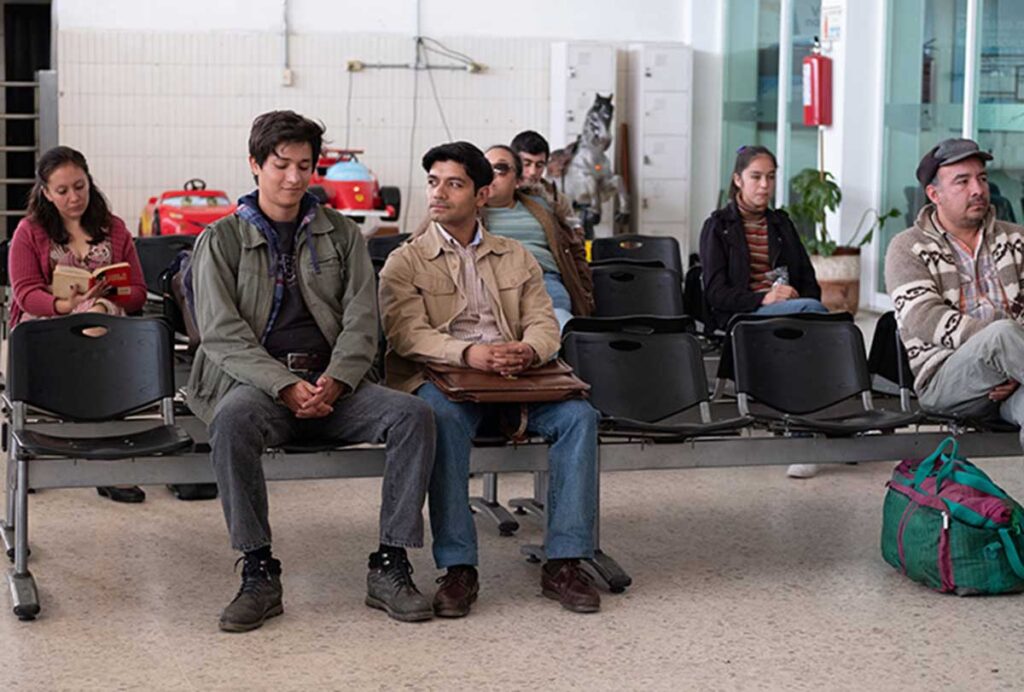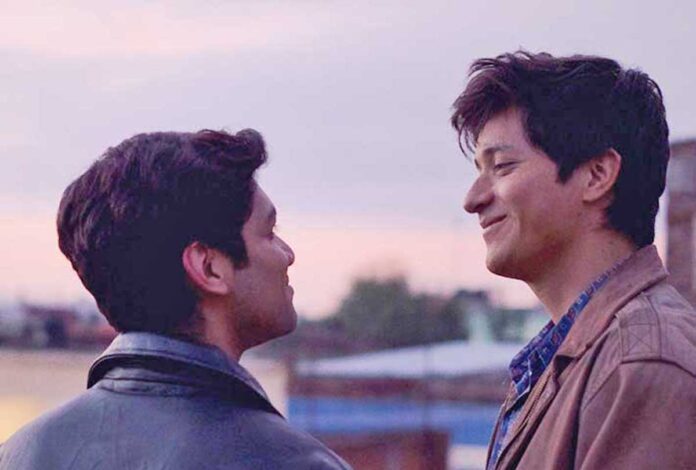“I Carry You with Me” opening July 2 at the Landmark Ritz 5, is a compassionate, heartfelt film, based on a true story, about Iván, a gay Mexican chef who comes to America in search of a better life. Directed and cowritten by Heidi Ewing — a documentarian making her feature narrative debut — the story toggles back and forth between present day Iván (played by Iván himself) and young Iván (Armando Espitia).
In Mexico, Iván is barely scraping by and not out to his family. When he goes to a gay bar one night and meets Gerardo (Christian Vazquez), sparks fly. The two men soon become inseparable — that is, until Iván decides to leave for America.
“I Carry You with Me” portrays the perils of immigration and being undocumented as well as concerns the men have about being deported once in America. The film uses these two narrative strands about living in hiding — being closeted in Mexico to being undocumented in America — to make its points about how people should be allowed to be who they are where they are.
Armando Espitia, who plays the young Iván, spoke with Philadelphia Gay News about making “I Carry You with Me.”

What are your thoughts on Iván’s character and situation?
I think he’s complicated; that’s what makes him interesting for me. He wants simple things, but for him, in his situation, it is not easy to get them. He may be seen as ambitious or selfish, but for me, Iván is someone willing to do whatever it takes for what he thinks is good for him and his family, and that’s what I love about Iván.
Iván tells Gerardo he knows how to pass. What can you say about the film’s depiction and visibility of LGBTQ people in Mexico?
We were trying to portray this culture from the early ‘90s in a small town in Mexico, and that is not the same as the queer scene in Mexico City. And it is different from how the gay community in Mexico is today. For Iván, passing was how he behaved.

The film plays up the machismo culture in Mexico and there are scenes of Iván and Gerardo being scolded for feminine behaviors. What observations do you have about how gay men are perceived in Mexico?
I think characters like this and stories like this are important for Mexican people because the machismo is not easy for us to see. It is deep inside our culture. Even though we are moving forward with respect for LGBTQ community, it is important for families in Mexico to see. For example, my dad was very, very moved by this film, and he wanted or needed to say, “I’m sorry,” after he watched the film because he got to see a homophobic dad in the character of Iván’s dad in the film. He saw himself in a way. After we saw the film, he said, “Now I see how much damage a dad can do to his son by not knowing how to treat him.” He understood that the dads in the film were not bad dads, or bad people, they just didn’t know how to treat a different child. And that’s the culture. This film will do that for a lot of people, and I’m glad we can do that.
Yes, the film humanizes its gay characters…
We need to stop romanticizing or showing stereotypes of the experiences of being queer or gay or lesbian, or trans. We need to stop creating those characters or sending messages that we are hypersexualized, or all gay men are sexy and work on their bodies. In the Mexican media, we are only seeing flamboyant characters. We need to represent that part of our culture, but it’s not everything. Heidi [Ewing] said that gay men made comments that if this film doesn’t have gay sex, it is not a “gay” movie. I love that comment. I’m not pretending this is a gay movie, it’s just a movie. It’s sad that the gay public are expecting gay [sex] scenes to consider it a gay movie. It is what the audience wants it to be. It can be a gay film for some, a love story for other people, but it’s risky when you assign a film for a specific audience. Producers think that they know what the LGBT community wants.
What do you think about the parallels about living in hiding — either being closeted in Mexico to being undocumented in America?
It is a shame. We’re building communities that are forcing people to live in hiding either for their sexuality or their legal status. That’s ridiculous! Movies like this are trying to open those doors and show the people who are hiding behind them. We need to be open about these issues facing society. That’s the first step — to start talking about these issues.
What do you think about the sacrifices Iván made to have a better life? He has a sense of accomplishment, but he also has a sense of regret.
Of course, accomplishment, because it was difficult; it took a lot from him to get to that point in this culture and society. What he learned being a kid in Mexico was that if you go to America and earn money you will be happy. That’s what society says, but that’s not true. What he achieved in America is professional status, but his personal life and family life and this part of his origins and community and identity is kind of missing. He doesn’t have clarity of who he is sometimes, or where he belongs, and that is a big important part of us. He lives and focuses only on his professional life.
I’m curious, are you a good cook like Iván?
Not as good as Iván, but I do cook sometimes. I learned how to make Chiles en Nogada, which Iván makes for Gerardo on their first date. It is very popular in Mexico and everyone eats it on Independence Day. I never tried them before. And I made cochinita pibil — Iván guided me. It was amazing. Iván was gentle and kind with me when I was playing him. He didn’t say anything to me, but he was very strict with the food. Very demanding with the presentation of the dishes and the recipes. He must be a very strict boss. He was yelling at me! “This is not the way we present the enchiladas!” It was fun to follow his rhythm of work.
